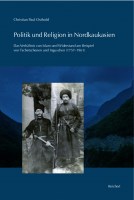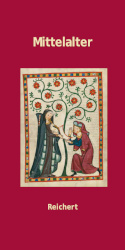Search
Politik und Religion in Nordkaukasien
Das Verhältnis von Islam und Widerstand am Beispiel von Tschetschenen und Inguschen (1757–1961)
2019
17.0 x 24.0 cm, 684 p., illustrations color, illustrations b/w, hardback
ISBN: 9783954903979
17.0 x 24.0 cm, 684 p., illustrations color, illustrations b/w, hardback
148,00 €
ISBN: 9783954903979
Short Description
This study clarifies the question to what extent the narrative of the Chechens, which has been handed down for centuries by Russian historians, is a religious fanatic. To this end, the importance of Islam between 1757 and 1961 for the militant resistance of the Chechens to the central state is examined. The result is a theoretical model describing Islam as a multifunctional stability regulator of the Chechen social fabric, which preserved it from the continued exogenous violence by Russia.Description
Chechnya plays a unique role in the history of Russia. Like no other people whom the Czars fought to establish their empire, the Chechens have always answered with great vehemence all attempts to force them under Russian supremacy. The quest to defend one's own independence runs like a thread through Chechen history and has formed a century-long continuity. For more than 250 years, a conflict has raged that, with only a few interruptions, reaches into the early 21st century and has been perceived in Europe mainly by the post-Soviet Chechnya wars. The devastating power of this dispute has always emanated from an ideological mixture, the once triggered ignition repeatedly flared the destructive flames of violence to a powerful conflagration.As early as 1757, the first major Russian campaign set in motion a spiral of escalating violence, which accelerated steadily in the period that followed, culminating in a massive insurrection in 1785. The fact that it was first used by Islam as a jihad to expel the infidels encouraged Russian leaders in their judgment to experience the profound manifestation of the religious fanaticism of a people whose unprecedented practices of lawlessness and barbarism made any coexistence impossible. This highly arrogant finding was responsible for putting the behaviour of the Chechens in a religious frame of reference and henceforth interpreted all forms of intransigence as proof of the anti-Russian character of their Islam. This indelible stigma no longer clings to the Chechens only in the consciousness of the Russian public, but also of the international public.
Against this background, this study examines the question of how true this premise actually is. For this purpose, the relationship between Islam and militant resistance against the central state is examined over the course of 204 years. The result is a theoretical model that describes Islam as a multifunctional stability regulator of the Chechen social fabric. It shows that between 1757 and 1961 Islam aggregated various socially effective functions which it did not lose after having acquired it once. Although these functions manifested themselves in different situations, they always produced the same effect: they strengthened the internal cohesion of the tribal and deeply fragmented Chechen social fabric in relation to the military expansion of the central state and its attempts to change the traditional society of the Chechens by exogenous violence.




 Preface
Preface

 Neuerscheinungen 2023/2024
Neuerscheinungen 2023/2024
 Gesamtverzeichnis 2023/2024
Gesamtverzeichnis 2023/2024
 Katalog Oriental Studies & Linguistics
Katalog Oriental Studies & Linguistics
 Mittelalter
Mittelalter
 Deutsche Inschriften
Deutsche Inschriften
 Musiktherapie
Musiktherapie
 Literaturen im Kontext
Literaturen im Kontext